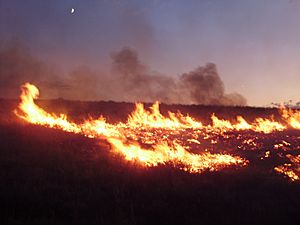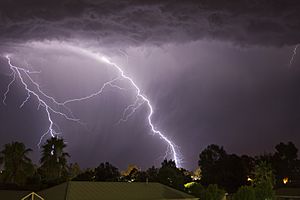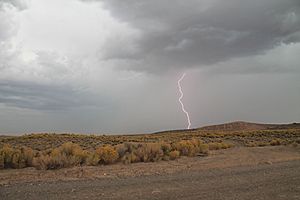Dry thunderstorm facts for kids
A dry thunderstorm is a special kind of thunderstorm. It has lightning and thunder, just like a regular storm. But here's the big difference: most or all of the rain doesn't actually reach the ground!
This happens because dry thunderstorms often form in places like deserts or areas with very little moisture in the air. The air is so dry that it "drinks up" the raindrops before they can hit the ground. You might see streaks of rain falling from the clouds, but they disappear before they get to you. These storms are quite common in places like western North America during the summer.
Dry thunderstorms can be quite risky. They can cause huge dust storms and dangerous wildfires. Dust storms happen when strong winds pick up dry soil and sand. Wildfires start when lightning strikes trees or plants, and since there's no rain, the fires can spread easily.
What Makes Dry Thunderstorms Dangerous?
Dry thunderstorms are known for two main dangers. First, they are the most common natural way that wildfires start. Second, they can create very strong, gusty winds. These winds can make fires spread even faster.
How Do Dry Thunderstorms Cause Dust Storms?
Strong winds often form around dry thunderstorms. This happens because the rain that evaporates cools the air under the storm a lot. This cool air then drops very quickly and spreads out when it hits the ground. This event is often called a dry microburst.
As these strong, gusty winds move away from the storm, they can pick up dry soil and sand. This creates huge clouds of dust and sand, known as haboobs. These dust storms can be so big they look like a wall of dirt moving across the land.
How Do Dry Thunderstorms Cause Wildfires?

In areas with trees or other plants, there is little to no rain to stop lightning from starting fires. When lightning strikes a tree, it can easily catch fire. The strong winds from the storm also push the fire and firestorm, making it spread much more quickly.
Sometimes, a special type of cloud called a pyrocumulonimbus cloud can form over a very large fire. These clouds are quite dry. When the air high up is cooler, and the ground is super hot from a wildfire or volcano, warm air rises. This rising air can create clouds and even lightning. These clouds are similar to regular cumulus clouds, but they suck up extra tiny bits of ash and smoke from the fire. This makes the electrical charge difference inside the cloud even bigger, which helps create more lightning.
 | John T. Biggers |
 | Thomas Blackshear |
 | Mark Bradford |
 | Beverly Buchanan |



